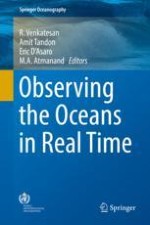2018 | OriginalPaper | Buchkapitel
Managing Meteorological and Oceanographic In Situ Data in the WMO Framework
verfasst von : Etienne Charpentier
Erschienen in: Observing the Oceans in Real Time
Aktivieren Sie unsere intelligente Suche, um passende Fachinhalte oder Patente zu finden.
Wählen Sie Textabschnitte aus um mit Künstlicher Intelligenz passenden Patente zu finden. powered by
Markieren Sie Textabschnitte, um KI-gestützt weitere passende Inhalte zu finden. powered by
